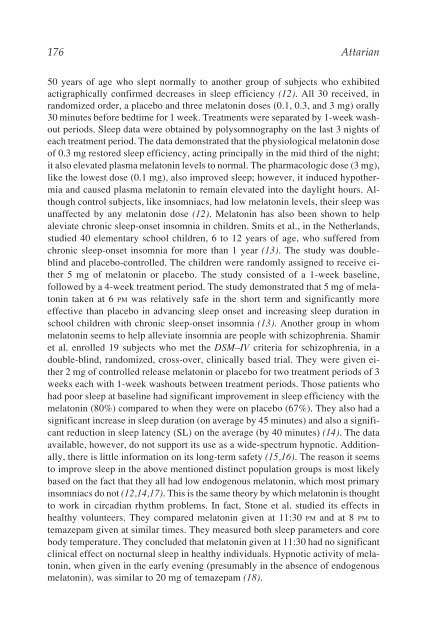Insomnia Insomnia
Insomnia Insomnia
Insomnia Insomnia
You also want an ePaper? Increase the reach of your titles
YUMPU automatically turns print PDFs into web optimized ePapers that Google loves.
176 Attarian<br />
50 years of age who slept normally to another group of subjects who exhibited<br />
actigraphically confirmed decreases in sleep efficiency (12). All 30 received, in<br />
randomized order, a placebo and three melatonin doses (0.1, 0.3, and 3 mg) orally<br />
30 minutes before bedtime for 1 week. Treatments were separated by 1-week washout<br />
periods. Sleep data were obtained by polysomnography on the last 3 nights of<br />
each treatment period. The data demonstrated that the physiological melatonin dose<br />
of 0.3 mg restored sleep efficiency, acting principally in the mid third of the night;<br />
it also elevated plasma melatonin levels to normal. The pharmacologic dose (3 mg),<br />
like the lowest dose (0.1 mg), also improved sleep; however, it induced hypothermia<br />
and caused plasma melatonin to remain elevated into the daylight hours. Although<br />
control subjects, like insomniacs, had low melatonin levels, their sleep was<br />
unaffected by any melatonin dose (12). Melatonin has also been shown to help<br />
aleviate chronic sleep-onset insomnia in children. Smits et al., in the Netherlands,<br />
studied 40 elementary school children, 6 to 12 years of age, who suffered from<br />
chronic sleep-onset insomnia for more than 1 year (13). The study was doubleblind<br />
and placebo-controlled. The children were randomly assigned to receive either<br />
5 mg of melatonin or placebo. The study consisted of a 1-week baseline,<br />
followed by a 4-week treatment period. The study demonstrated that 5 mg of melatonin<br />
taken at 6 PM was relatively safe in the short term and significantly more<br />
effective than placebo in advancing sleep onset and increasing sleep duration in<br />
school children with chronic sleep-onset insomnia (13). Another group in whom<br />
melatonin seems to help alleviate insomnia are people with schizophrenia. Shamir<br />
et al. enrolled 19 subjects who met the DSM–IV criteria for schizophrenia, in a<br />
double-blind, randomized, cross-over, clinically based trial. They were given either<br />
2 mg of controlled release melatonin or placebo for two treatment periods of 3<br />
weeks each with 1-week washouts between treatment periods. Those patients who<br />
had poor sleep at baseline had significant improvement in sleep efficiency with the<br />
melatonin (80%) compared to when they were on placebo (67%). They also had a<br />
significant increase in sleep duration (on average by 45 minutes) and also a significant<br />
reduction in sleep latency (SL) on the average (by 40 minutes) (14). The data<br />
available, however, do not support its use as a wide-spectrum hypnotic. Additionally,<br />
there is little information on its long-term safety (15,16). The reason it seems<br />
to improve sleep in the above mentioned distinct population groups is most likely<br />
based on the fact that they all had low endogenous melatonin, which most primary<br />
insomniacs do not (12,14,17). This is the same theory by which melatonin is thought<br />
to work in circadian rhythm problems. In fact, Stone et al. studied its effects in<br />
healthy volunteers. They compared melatonin given at 11:30 PM and at 8 PM to<br />
temazepam given at similar times. They measured both sleep parameters and core<br />
body temperature. They concluded that melatonin given at 11:30 had no significant<br />
clinical effect on nocturnal sleep in healthy individuals. Hypnotic activity of melatonin,<br />
when given in the early evening (presumably in the absence of endogenous<br />
melatonin), was similar to 20 mg of temazepam (18).


